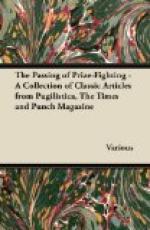The small oft-loaded pipe, of ancient
moulding,
The brazen box that held the
well-loved weed;
Who shall forget who once was graced by
holding
In friendship’s clasp
the hand now still indeed?
Farewell, great artist, comrade staunch
and loyal!
Few simpler lives our feverish
age hath seen.
Could pomp high-pinnacled, or trappings
royal,
Add honour to the memory of
CHARLES KEENE?
* * * * *
[Illustration: GOBLIN TRANSFORMATION SCENE FROM THE IRISH EXTRAVAGANZA OF THE O’RIP VAN WINKLE.
Where the Home-Ruler of Butt’s time awakes to find all the would-be dic-taters suddenly become mere mushrooms.]
* * * * *
THE SHAH (LEFEVRE) AND THE SULTAN.
[Illustration]
Over a series of weeks preceding Christmas, Europe was disturbed by rumours of a momentous interview reported to have taken place on the banks of the unsuspecting Bosphorus. One of the parties to the conference was his Imperial Majesty the SULTAN. The other was an English Statesman, the trusted counsellor of an Ex-Premier, and believed in family circles to be the real author of some of his supreme measures. The naturally retiring disposition of the Statesman in question, and his inviolable reticence in respect of any matter concerning himself, made it difficult to arrive at the truth. Doubtless the stupendous event—the possible consequences of which on European affairs Time will work out—would have remained for ever hidden but for the ruthless action of “the London Correspondents of various provincial papers, who gave in their London letters more or less inaccurate reports of the event.” How they came to know anything about it admits of only one conclusion. The SULTAN must have told them. The event was too important to be left to this haphazard kind of record, and, accordingly, the Speaker has been favoured with a narrative of what took place, the signature disclosing the fact that the other party to the interview was the SHAH LEFEVRE.
The SHAH’s account, regarded as a record of a historical event, is manifestly hampered by that modest and insatiable desire for self-effacement which marks this eminent man. We see anonymous “persons who had access to the SULTAN approaching” the SHAH, and “suggesting to him that he ought to apply for an audience.” We see him “declining to do so on the ground that, having taken an active part in the agitation in England on the subject of the Bulgarian atrocities in 1877, it would not be right that I should thrust myself on the attention of the SULTAN.” It is generally thought at Stamboul and elsewhere that Mr. GLADSTONE was chiefly responsible for the memorable agitation referred to. But the SHAH is not the man to hide the truth. Also, “I wished to be free to say what I thought about the condition of Turkey on my return to England.”




